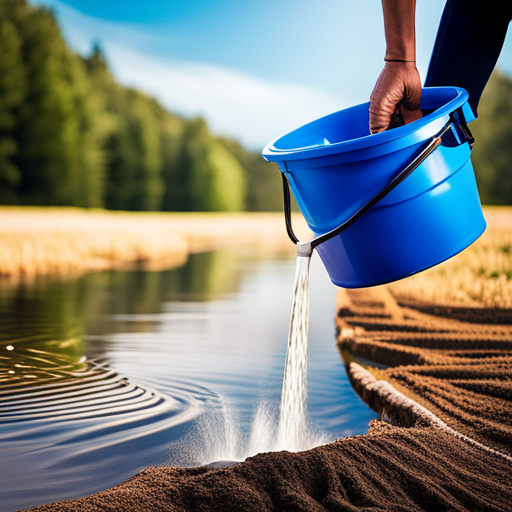Are you looking for ways to reduce your water bills and contribute to water conservation efforts? One way to do this is by reusing reverse osmosis (RO) waste water for household chores.
By using RO waste water for tasks such as washing dishes, cars, and clothes, you can conserve this precious resource and save money in the process.
Not only is reusing RO waste water a great way to practice sustainability, but it also has other benefits. This water can be used for various household chores without compromising the quality of the task.
Plus, using RO waste water for your pets and plants can also help keep them healthy and thriving. In this article, we will explore the many benefits of reusing RO waste water for cleaning and savings, and provide tips on how to get started with this eco-friendly practice.
Key Takeaways
– RO waste water can be used for household chores such as washing dishes, floors, clothes, and plants.
– Diluted RO waste water can be used to bathe pets with high-quality pet shampoo.
– Using RO waste water for household chores can help conserve water and reduce water bills.
– RO waste water can be collected in a holding tank or returned to the hot water line for use.
Household Chores
You can use RO waste water to wash your dishes, floors, clothes, and even water your plants, helping you save water and reduce your bills. To make the most of your RO waste water, try these cleaning tips and effective cleaning solutions.
When washing your dishes, rinse them with RO waste water before scrubbing them with tap water. This will help to remove any food particles and lead to cleaner dishes. Additionally, the salt in the RO waste water can help to clean your dishes and prevent food from sticking.
For floors and clothes, dilute the RO waste water and use it with a low-pH detergent and fabric softener to remove stains and dirt.
Finally, use RO waste water to water your plants and help them grow without having to use fresh water.
Pets and Plants
Your pets and plants can benefit from using reverse osmosis (RO) water. It’s a great way to conserve water, reduce your bills, and provide benefits for your furry friends and greenery.
Here are some tips and tricks for using RO waste water for pet and plant care:
– Diluted RO waste water can be used to bathe pets with high-quality pet shampoo, leaving their fur soft and shiny.
– RO waste water can be used to water plants. It’s free of contaminants and can help promote healthy growth.
– However, it’s important to monitor the effect of using RO waste water on plant growth. The TDS level should be permissible, and sodium levels should be low.
– Always be cautious when using RO waste water for pet or plant care. It does contain salt and should not be used for cooking or drinking.
Water Conservation
Conserving water is essential for our planet’s sustainability, and there are many simple ways to reduce water usage in our daily lives. One way to reduce water usage is by setting up gray water systems in your home. Gray water is wastewater that is generated from household activities such as washing dishes, clothes, and taking showers. Instead of letting this water go down the drain, it can be collected and reused for non-potable purposes such as irrigating your garden or flushing your toilet.
Another way to conserve water is by harvesting rainwater. Rainwater harvesting involves collecting rainwater from roofs and storing it for later use. This water can be used for a variety of purposes such as watering plants, washing cars, and flushing toilets. To give you an idea of the potential benefits of rainwater harvesting, take a look at this table:
| Type of Water | Amount Used Per Day | Annual Cost |
|---|---|---|
| Tap Water | 100 gallons | $584 |
| Gray Water | 50 gallons | $292 |
| Rainwater | 0 gallons | $0 |
As you can see, using gray water or rainwater can significantly reduce your water usage and save you money in the long run. Consider implementing these water conservation methods in your home to help protect our planet and save on your water bill.
Conclusion
So, now that you know all the benefits of reusing RO waste water for cleaning, it’s time to put this knowledge into action.
Start by collecting the waste water from your RO system and storing it in a clean container.
Then, use it for household chores such as washing dishes, cars, and clothes.
You can also use it to water your plants or give your pets a bath.
Remember to keep in mind that RO waste water may contain high levels of minerals and salts, so it’s important to test it before using it on delicate plants or fabrics.
Additionally, make sure to properly label the container so that it’s not accidentally ingested by humans or pets.
With these precautions in place, you can enjoy the benefits of water conservation and savings while also doing your part to protect this precious resource.




